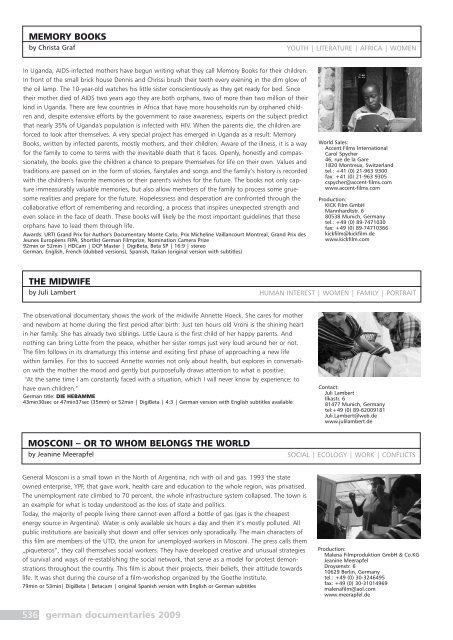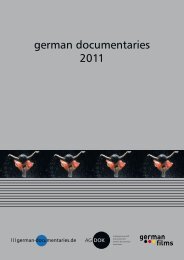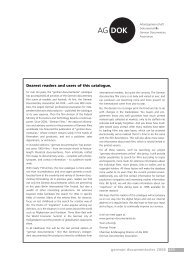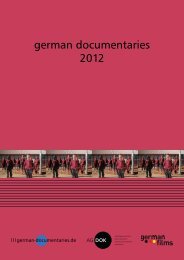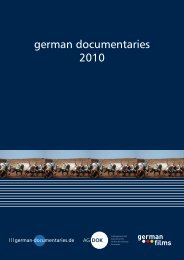Dearest readers and users of this catalogue, - German Documentaries
Dearest readers and users of this catalogue, - German Documentaries
Dearest readers and users of this catalogue, - German Documentaries
You also want an ePaper? Increase the reach of your titles
YUMPU automatically turns print PDFs into web optimized ePapers that Google loves.
MEMORY BOOKS<br />
by Christa Graf YOUTH | LITERATURE | AFRICA | WOMEN<br />
In Ug<strong>and</strong>a, AIDS-infected mothers have begun writing what they call Memory Books for their children.<br />
In front <strong>of</strong> the small brick house Dennis <strong>and</strong> Chrissi brush their teeth every evening in the dim glow <strong>of</strong><br />
the oil lamp. The 10-year-old watches his little sister conscientiously as they get ready for bed. Since<br />
their mother died <strong>of</strong> AIDS two years ago they are both orphans, two <strong>of</strong> more than two million <strong>of</strong> their<br />
kind in Ug<strong>and</strong>a. There are few countries in Africa that have more households run by orphaned children<br />
<strong>and</strong>, despite extensive efforts by the government to raise awareness, experts on the subject predict<br />
that nearly 35% <strong>of</strong> Ug<strong>and</strong>a's population is infected with HIV. When the parents die, the children are<br />
forced to look after themselves. A very special project has emerged in Ug<strong>and</strong>a as a result: Memory<br />
Books, written by infected parents, mostly mothers, <strong>and</strong> their children. Aware <strong>of</strong> the illness, it is a way<br />
for the family to come to terms with the inevitable death that it faces. Openly, honestly <strong>and</strong> compassionately,<br />
the books give the children a chance to prepare themselves for life on their own. Values <strong>and</strong><br />
traditions are passed on in the form <strong>of</strong> stories, fairytales <strong>and</strong> songs <strong>and</strong> the family’s history is recorded<br />
with the children's favorite memories or their parent's wishes for the future. The books not only capture<br />
immeasurably valuable memories, but also allow members <strong>of</strong> the family to process some gruesome<br />
realities <strong>and</strong> prepare for the future. Hopelessness <strong>and</strong> desperation are confronted through the<br />
collaborative effort <strong>of</strong> remembering <strong>and</strong> recording, a process that inspires unexpected strength <strong>and</strong><br />
even solace in the face <strong>of</strong> death. These books will likely be the most important guidelines that these<br />
orphans have to lead them through life.<br />
Awards: URTI Gr<strong>and</strong> Prix for Author's Documentary Monte Carlo, Prix Micheline Vaillancourt Montreal, Gr<strong>and</strong> Prix des<br />
Jeunes Europèens FIPA, Shortlist <strong>German</strong> Filmprize, Nomination Camera Prize<br />
92min or 52min | HDCam | DCP Master | DigiBeta, Beta SP | 16:9 | stereo<br />
<strong>German</strong>, English, French (dubbed versions), Spanish, Italian (original version with subtitles)<br />
The observational documentary shows the work <strong>of</strong> the midwife Annette Hoeck. She cares for mother<br />
<strong>and</strong> newborn at home during the first period after birth: Just ten hours old Vroni is the shining heart<br />
in her family. She has already two siblings. Little Laura is the first child <strong>of</strong> her happy parents. And<br />
nothing can bring Lotte from the peace, whether her sister romps just very loud around her or not.<br />
The film follows in its dramaturgy <strong>this</strong> intense <strong>and</strong> exciting first phase <strong>of</strong> approaching a new life<br />
within families. For <strong>this</strong> to succeed Annette worries not only about health, but explores in conversation<br />
with the mother the mood <strong>and</strong> gently but purposefully draws attention to what is positive.<br />
"At the same time I am constantly faced with a situation, which I will never know by experience: to<br />
have own children."<br />
<strong>German</strong> title: DIE HEBAMME<br />
43min30sec or 47min37sec (35mm) or 52min | DigiBeta | 4:3 | <strong>German</strong> version with English subtitles available<br />
General Mosconi is a small town in the North <strong>of</strong> Argentina, rich with oil <strong>and</strong> gas. 1993 the state<br />
owned enterprise, YPF, that gave work, health care <strong>and</strong> education to the whole region, was privatised.<br />
The unemployment rate climbed to 70 percent, the whole infrastructure system collapsed. The town is<br />
an example for what is today understood as the loss <strong>of</strong> state <strong>and</strong> politics.<br />
Today, the majority <strong>of</strong> people living there cannot even afford a bottle <strong>of</strong> gas (gas is the cheapest<br />
energy source in Argentina). Water is only available six hours a day <strong>and</strong> then it’s mostly polluted. All<br />
public institutions are basically shut down <strong>and</strong> <strong>of</strong>fer services only sporadically. The main characters <strong>of</strong><br />
<strong>this</strong> film are members <strong>of</strong> the UTD, the union for unemployed workers in Mosconi. The press calls them<br />
„piqueteros“, they call themselves social workers. They have developed creative <strong>and</strong> unusual strategies<br />
<strong>of</strong> survival <strong>and</strong> ways <strong>of</strong> re-establishing the social network, that serve as a model for protest demonstrations<br />
throughout the country. This film is about their projects, their beliefs, their attitude towards<br />
life. It was shot during the course <strong>of</strong> a film-workshop organized by the Goethe Institute.<br />
79min or 53min| DigiBeta | Betacam | original Spanish version with English or <strong>German</strong> subtitles<br />
536<br />
german documentaries 2009<br />
World Sales:<br />
Accent Films International<br />
Carol Spycher<br />
46, rue de la Gare<br />
1820 Montreux, Switzerl<strong>and</strong><br />
tel.: +41 (0) 21-963 9300<br />
fax: +41 (0) 21-963 9305<br />
cspycher@accent-films.com<br />
www.accent-films.com<br />
Production:<br />
KICK Film GmbH<br />
Mannhardtstr. 6<br />
80538 Munich, <strong>German</strong>y<br />
tel.: +49 (0) 89-7471030<br />
fax: +49 (0) 89-74710366<br />
kickfilm@kickfilm.de<br />
www.kickfilm.com<br />
THE MIDWIFE<br />
by Juli Lambert HUMAN INTEREST | WOMEN | FAMILY | PORTRAIT<br />
Contact:<br />
Juli Lambert<br />
Ilkastr. 6<br />
81477 Munich, <strong>German</strong>y<br />
tel:+49 (0) 89-62009181<br />
Juli.Lambert@web.de<br />
www.julilambert.de<br />
MOSCONI – OR TO WHOM BELONGS THE WORLD<br />
by Jeanine Meerapfel SOCIAL | ECOLOGY | WORK | CONFLICTS<br />
Production:<br />
Malena Filmproduktion GmbH & Co.KG<br />
Jeanine Meerapfel<br />
Droysenstr. 6<br />
10629 Berlin, <strong>German</strong>y<br />
tel.: +49 (0) 30-3246495<br />
fax: +49 (0) 30-31014969<br />
malenafilm@aol.com<br />
www.meerapfel.de


